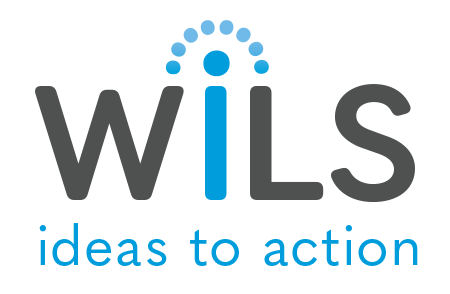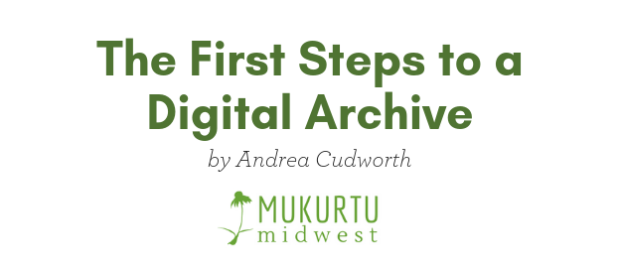
by Andrea Cudworth, Midwest Mukurtu Hub Project Assistant
Enjoy this guest feature from Andrea Cudworth on her path to becoming Midwest Mukurtu Hub Project Assistant!
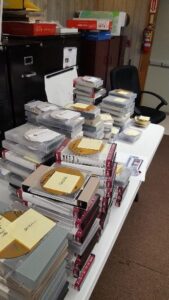 In 2017 I had the opportunity to take a Service Learning class on Tribal Libraries, Archives, and Museums (TLAM) in the Information School at UW-Madison. This was a bit of a departure for me as I was a grad student in the Linguistics department and hadn’t branched out much beyond my regular linguistics courses and the linguistics-related extra-curriculars my advisors directed me to. When the instructor of the class, Omar Poler, gave us our project options, I was immediately drawn to the Ho-Chunk Language division.
In 2017 I had the opportunity to take a Service Learning class on Tribal Libraries, Archives, and Museums (TLAM) in the Information School at UW-Madison. This was a bit of a departure for me as I was a grad student in the Linguistics department and hadn’t branched out much beyond my regular linguistics courses and the linguistics-related extra-curriculars my advisors directed me to. When the instructor of the class, Omar Poler, gave us our project options, I was immediately drawn to the Ho-Chunk Language division.
As a group of young, developing professionals with very little real-world experience in our chosen fields, the other information school students, a fellow linguist, and I began what would become the Hoocąk Waaziija Haci Language Division (HLD) Archiving Project. When we were first introduced to the Language Division project, it was clear that an amazing amount of work was happening behind the scenes to help the Ho-Chunk community learn the Ho-Chunk language. Since 1994 the Language Division has compiled large amounts of language materials developed for various programs to assist with revitalizing and preserving the Ho-Chunk language.
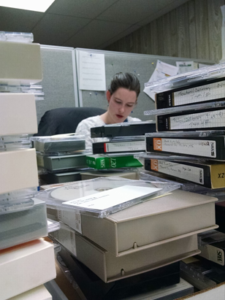 It was daunting to be presented with so many original materials. Our group, although overwhelmed at first, dug in and began to work through the materials to help the HLD create better accessibility for the Ho-Chunk community members. We developed a cataloging system guided by the materials themselves. We chose to have the metadata for the database reflect the content that the Language Division had, rather than try to shoehorn it into a pre-existing standard that wasn’t an accurate representation of Ho-Chunk knowledge. By the end of the first semester, we had cataloged about 300 videos and 50 paper documents consisting of a variety of language materials such as grammars and lexicons, worksheets, textbooks, etc. We also developed an action plan for moving the project forward.
It was daunting to be presented with so many original materials. Our group, although overwhelmed at first, dug in and began to work through the materials to help the HLD create better accessibility for the Ho-Chunk community members. We developed a cataloging system guided by the materials themselves. We chose to have the metadata for the database reflect the content that the Language Division had, rather than try to shoehorn it into a pre-existing standard that wasn’t an accurate representation of Ho-Chunk knowledge. By the end of the first semester, we had cataloged about 300 videos and 50 paper documents consisting of a variety of language materials such as grammars and lexicons, worksheets, textbooks, etc. We also developed an action plan for moving the project forward.
A few students from that class and I continued to volunteer our time working on the project throughout the summer and following fall. By the next spring, I was the only remaining student from the original group to still be involved with the project, but a new crop of eager young TLAM students was on their way to join up. By the end of that semester, the Digital Archiving project had a development plan for a variety of facets of the project, including a digitization plan for all the AV materials. The project had finally reached the point where we needed a plan to provide access to all the community members, especially those who don’t live near enough to drive to the Language Division.
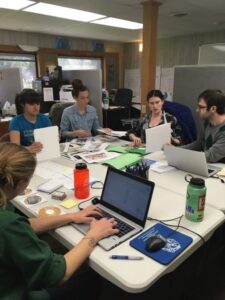 This is where Mukurtu became key to the project. Mukurtu is a free and open source digital archive and content management tool aimed at the specific needs of Indigenous peoples globally. It is a tool that can be adapted to the local cultural protocols and dynamic intellectual property needs of any community. Emily Pfotenhauer and Erin F.H. Hughes from WiLS approached me in the summer of 2018 about taking the lead on incorporating the Ho-Chunk Digital Archiving project into the Mukurtu database. My work has been supported through the IMLS grant
This is where Mukurtu became key to the project. Mukurtu is a free and open source digital archive and content management tool aimed at the specific needs of Indigenous peoples globally. It is a tool that can be adapted to the local cultural protocols and dynamic intellectual property needs of any community. Emily Pfotenhauer and Erin F.H. Hughes from WiLS approached me in the summer of 2018 about taking the lead on incorporating the Ho-Chunk Digital Archiving project into the Mukurtu database. My work has been supported through the IMLS grant
Mukurtu Hubs & Spokes: A Sustainable National Platform for Community Digital Archiving and the IMLS grant Growing Great Lakes Culture Keepers: Bringing Together LIS Students and Tribal Librarians Archivists, and Museum Curators to Create Through Continuing Education. Of course, all this work couldn’t be conducted without the constant support from the leaders at the HLD. We are working with Mukurtu to showcase the HLD materials in a way that highlights their importance to the Ho-Chunk community. This includes everything from recorded language lessons and elder interviews to historical texts on the people and lifeways of the past and present.
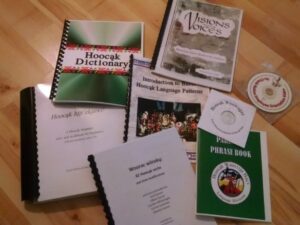 The key to such an important project focusing on representation is community cooperation and engagement. Through this project, I have learned so much from the folks I have worked with. They have given me invaluable insights into the importance of their language and what a project like this means to them. I have been so lucky to be a part of a project like this, where I can offer my expertise. The Ho-Chunk themselves are the ones guiding and developing the content of the website, especially the Language Division Program Manager Adrienne Thunder, who has been with this project since the beginning, and the newly hired Project Specialist George Greendeer. I facilitate making this happen, and I have enjoyed every minute of the learning process. This project has helped me develop invaluable skills in coordination, cooperation, and sensitivity, as well as technological and organization skills. The most important benefit this project has given me is knowing how much this project means to the Ho-Chunk.
The key to such an important project focusing on representation is community cooperation and engagement. Through this project, I have learned so much from the folks I have worked with. They have given me invaluable insights into the importance of their language and what a project like this means to them. I have been so lucky to be a part of a project like this, where I can offer my expertise. The Ho-Chunk themselves are the ones guiding and developing the content of the website, especially the Language Division Program Manager Adrienne Thunder, who has been with this project since the beginning, and the newly hired Project Specialist George Greendeer. I facilitate making this happen, and I have enjoyed every minute of the learning process. This project has helped me develop invaluable skills in coordination, cooperation, and sensitivity, as well as technological and organization skills. The most important benefit this project has given me is knowing how much this project means to the Ho-Chunk.
While the project is still in its early stages of development, a few digital heritage items, collections, and categories can be seen at the Mukurtu Midwest sandbox site: https://mukurtu-midwest.libraries.wsu.edu/
